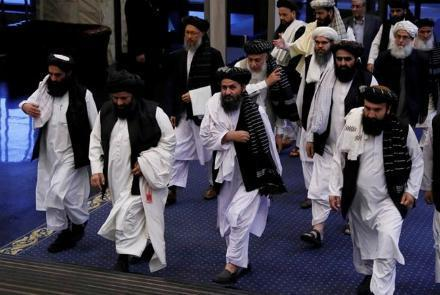Taliban Seeks Agreement on New Govt Before Any Ceasefire: AP

A Taliban spokesman has said they don’t want to monopolize power but insisted that there won’t be peace in Afghanistan until there is a new negotiated government in Kabul and President Ashraf Ghani is removed.
In an interview with The Associated Press, Suhail Shaheen, Taliban spokesman and a member of the group’s negotiating team, said the Taliban will lay down their weapons when a negotiated government acceptable to all sides in the conflict is installed in Kabul and Ghani’s government is gone.
“I want to make it clear that we do not believe in the monopoly of power because any governments who (sought) to monopolize power in Afghanistan in the past, were not successful governments,” said Shaheen in the interview.
“So we do not want to repeat that same formula.”
He called the talks a good beginning but said the government’s repeated demands for a ceasefire while Ghani stayed in power were tantamount to demanding a Taliban surrender.
“They don’t want reconciliation, but they want surrendering,” he said.
Before any ceasefire, there must be an agreement on a new government “acceptable to us and to other Afghans,” he said in the AP interview. Then “there will be no war.”
Shaheen said under this new government, women will be allowed to work, go to school, and participate in politics, but will have to wear the hijab, or headscarf.
He said women won’t be required to have a male relative with them to leave their home, and that Taliban commanders in newly occupied districts have orders that universities, schools and markets operate as before, including with the participation of women and girls.
Shaheen said some Taliban commanders had ignored the leadership’s orders against repressive and drastic behavior and that several have been put before a Taliban military tribunal and punished, though he did provide specifics.
He contended the video was fake, a splicing of separate footage.
He said there are no plans to make a military push on Kabul and that the Taliban have so far “restrained” themselves from taking provincial capitals.
But he warned they could, given the weapons and equipment they have acquired in newly captured districts.
He contended that the majority of the Taliban’s battlefield successes came through negotiations, not fighting.
“Those districts which have fallen to us and the military forces who have joined us … were through mediation of the people, through talks,” he said. “They (did not fall) through fighting … it would have been very hard for us to take 194 districts in just eight weeks.”
This comes as US Secretary of Defense Lloyd J. Austin on Wednesday said that the withdrawal of American troops will finish by end of August.
Meanwhile, Gen. Mark Milley said that all the military operating bases outside of Kabul have been fully transferred to the Afghan Ministry of Defense and the Afghan security forces.
